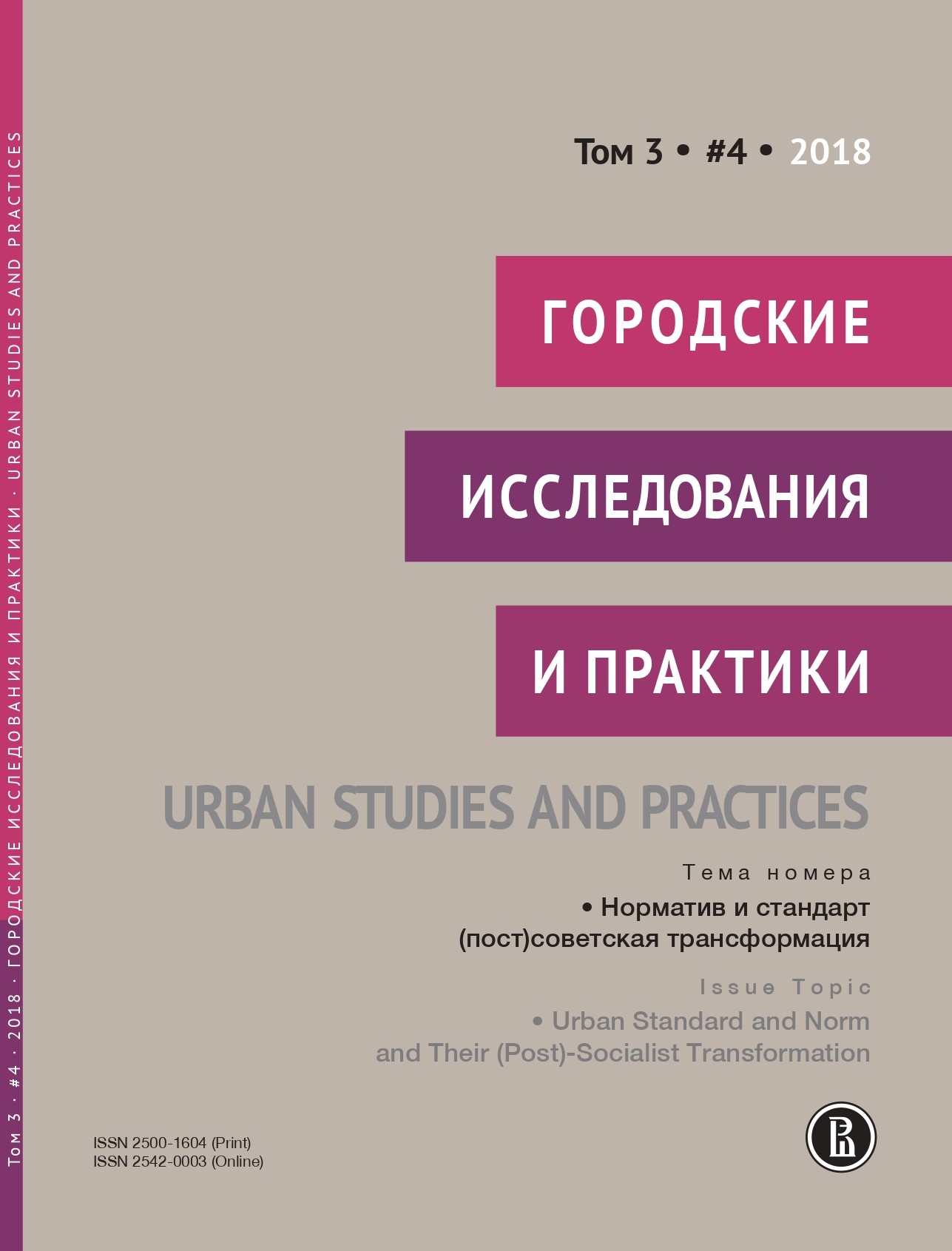Расширение домашнего пространства в постсоветской России, или как дача в Московском регионе трансформируется в загородный дом
Аннотация
В статье описывается трансформация пространства традиционной советской дачи в загородный дом, подходящий для круглогодичного проживания. Интервью и наблюдения, проведенные в Московском регионе, позволяют сделать вывод, что советская дача была местом труда с незначительным пространством для жизни, а в постсоветское время она постепенно преобразовалась в полноценный загородный дом, сократив значение трудовых практик и пространств. Таким образом, современное дачное пространство — это второй дом горожанина и социальный институт как для городских семей с детьми, так и для пенсионеров. Интерсекциональный анализ показывает, что жители дачи — это люди, которые имеют возможность быть «независимыми» от города: пенсионеры, дети и родители, работающие удаленно. Данные онлайн-фокус-группы объясняют, почему молодых людей (студентов), которые тесно связаны с городскими практиками и обычно предпочитают городской образ жизни, дача как место проживания не привлекает. Однако образом «будущего дома» для молодых людей является «коттедж» или таунхаус, расположенный недалеко от города. Это означает, что загородный дом и комфортный образ жизни могут стать трендом даже среди взрослого населения Московской области.
Скачивания
Литература
Аверкиева K.В., Нефедова T.Г. (2016) Дачная «колонизация» российской глубинки. Пример Костромской области // Мир России. Т. 25. No 1. С. 103–128.
Алексеев M. (2016) Дача — русская национальная мечта. Режим доступа: [https://esquire.ru/articles/8692-alekseevsky/#part2](https://esquire.ru/articles/8692-alekseevsky/#part2) (дата обращения: 13.09.2018).
Малинова-Тзиафета O. (2013) Из города на дачу: социокультурные процессы освоения дачного пространства вокруг Петербурга (1860–1914). СПб.: Изд-во Европейского ун-та.
Полухина E. (2014) Особенности социального порядка в постсоветском дачном пространстве: труд, поколения и гендер // Лабиринт. Т. 3. С. 22–31.
Чалых Н. (ред.) (2008) Наша Николина Гора. Кн. 2. Москва.
Чеховских И.А. (1998) Новые рыночные стратегии молодежи в неформальной экономике. Молодая Россия: потерянное поколение или надежда XXI века? Российская ювенологическая научно-практическая конференция. Москва.
Чеховских И.А. (2001) Российская дача — субурбанизация или рурализация / Центр независимых социологических исследований. СПб. Режим доступа: [http://www.cisr.pro/files/old/sbornik9/9_chekh.htm](http://www.cisr.pro/files/old/sbornik9/9_chekh.htm) (accessed 6 September 2018).
Тараканов Д. (2007) Дачные поселки Подмосковья в конце XIX — начале XX века: автореф. дис. ... канд. ист. наук.
Шмерлина И. (2007) Свободное время — навязанное пространство жизни? // Социальная реальность. No 8. С. 6–31.
Amin A., Thrift N. (2000) Cities: Reimagining the Urban. Cambridge: Polity.
Balfe J.H. (1995) The Inheritance of Summer Houses and Cultural Identity // The American Sociologist. Vol. 26. No. 4. P. 29–40.
Berg P.G., Nycander G. (1997) Sustainable neighbourhoods — a qualitative model for resource management in communities // Landscape and Urban Planning. No. 39. P. 117–135.
Bochardt I. (2007) Seasonal leisure spaces: dachas in Western Siberia // Culture. P. 8–10.
Chaplin D. (1999) Consuming work/productive leisure: the consumption patterns of second home environments. Leisure Studies. Vol. 18. No. 1. P. 41–55.
Clarke S. et al. (2000) The Myth of the Urban Peasant. Work, Employment and Society. No. 14. P. 481–499.
Colantonio А., Dixon T. (2009) Measuring Socially Sustainable Urban Regeneration in Europe, Oxford Institute for Sustainable.
Dominanty Project (2012). FOMnibus Survey. Public Opinion Foundation. Режим доступа: [http://fom.ru/Rabota-i-dom/10432](http://fom.ru/Rabota-i-dom/10432) (дата обращения: 06.09.2018).
Ekström K.M., Ekström M.P., Potapova M., Shanahan H. (2003) Changes in food provision in Russian households experiencing perestroika // International Journal of Consumer Studies. Vol. 27. No. 4. P. 294–301.
Galtz N. (2000) Other Spaces and Everyday Ones: Promise and limits of Foucault’s heterotopia for the study of everyday life.
Gerry C.J., Li C.A. (2010) Consumption smoothing and vulnerability in Russia // Applied Economics. Vol. 42. No. 16. P. 1995–2007.
Giddens A. (1999) Runaway World: How Globalization is Reshaping Our Lives. London.
Harrison J. (2013) A timeless place: the Ontario cottage. UBC Press.
Inglehart R., Wetzel C. (2008) Changing Mass Priorities: The Link between Modernization and Democracy // Perspective on politics. Vol. 8. No. 2. P. 551–567.
Levada Center (2017). Dacha i domashniye zagotovki [Dacha and home preparations]. Режим доступа: [https://www.levada.ru/2017/10/25/16909/](https://www.levada.ru/2017/10/25/16909/) (дата обращения: 06.09.2018). (in Russian)
Lovell S. (2002) Soviet Exurbia: Dachas in Postwar Russia. Socialist spaces: sites of Everyday life in Eastern Bloc / D. Crowley, S. Reid, E. Berg (eds). P. 105–120.
Lovell S. (2008) ‘Summerfolk: A History of the Dacha, 1710–2000.’ Moscow. Academicals Project.
Marsh M. (1988) Suburban Men and Masculine Domesticity, 1870–1915 // American Quarterly. Vol. 40. No. 2. P. 165–186.
Matthews H., Limb M. (1999) Defining an Agenda for the Geography of Children // Progress in Human Geography. Vol. 23. No. 1. P. 61–90.
McReynolds L. (2003) Russia at Play: Leisure Activities at the End of the Tsarist Era. Ithaca, NY; L.: Cornell University Press.
Ries N. (2009) Potato Ontology: Surviving Postsocialism in Russia // Cultural Anthropology. Vol. 24. no. 2. P. 181–212.
Rose R., Tikhomirov E. (1993) Who Grows Food in Russia and Eastern Europe? // Post Soviet Geography. Vol. 34. No. 2. P. 111–126.
Southworth C. (2006) The Dacha Debate: Household Agriculture and Labor Markets in Post-Socialist Russia // Rural Sociology. Vol. 71. No. 3. P. 451–478.
Strebkov D., Shevchuk A. (2012) Electronic Self-Employment in Russia // Problems of Economic Transition. Vol. 55. No. 5. P. 76–97.
Struyk R.J., Angelici K. (1996) The Russian dacha phenomenon // Housing Studies. Vol. 11. No. 2. P. 233–250.
Urry J. (2007) Mobilities. Cambridge: Polity.
Yin R.K. (2014) Case Study Research. Design and Methods. 5 ed. SAGE Publications.
Zavisca J. (2003) Contesting Capitalism at the Post-Soviet Dacha: The Meaning of Food Cultivation for Urban // Slavic Review. Vol. 62. No. 4. P. 786–810.

